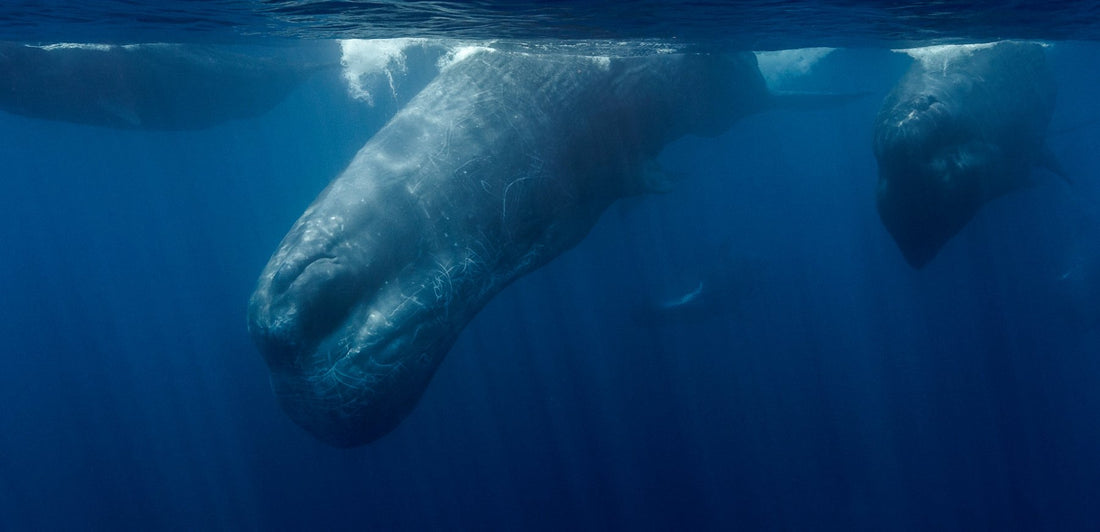Off the stunning coast of Dominica in the Eastern Caribbean a team of scientists are working on an incredible project: using AI to listen to how sperm whales communicate, to learn their language, and then – slowly but surely – begin talking back.
Known as CETI (Cetacean Translation Initiative), the non-profit project is backed by some of the world’s most renowned academic institutions as well as some of the biggest players in the business world. Can their team learn how to talk to whales and help us better understand these incredible creatures? Should we even be trying to muscle in on conversations held by these giants of the deep that form a part of TWOTHIRDS’ DNA?
Why are Scientists Trying to Talk to Whales?
Conservation is the principal reason. One of the most successful conservation projects ever created was Save the Whales, its popularity fueled by a scientific discovery made at the time by the late professor and former CETI advisor, Dr. Roger Payne. Payne and his colleagues were the first people to record the noises made by humpback whales, recordings which became known as Songs of the Humpback Whale…
Western populations – just a few thousand years behind their aboriginal and indigenous peers – were stunned by the realisation that animals appeared capable of speech and even song. What followed was an outpouring of love and subsequent funding for conservation projects, all of which put huge pressure on whaling operations around the world. This was exactly what Payne had intended. At the time he had been fighting the threat of hunting, but soon came to realise that pollution (particularly noise and water varieties) would ultimately prove even greater threats to whale populations.
“Remote and imperturbable, the lives of whales are somehow enough to match any fantasy humanity can create. They are what we have lost, what we yearn for.”
- Roger Payne
What has CETI Learned so far?
At the time of writing, the CETI team is still in a phase of data collection and analysis, using the AI technology behind systems like ChatGPT not to decipher exactly what whales are saying, but to train machine-learning algorithms to do so in the future. The process of collecting such data is well documented in The New Yorker, where Gruber’s team explain how they attach recording devices to whales using a drone controlled via a VR headset.
So far, CETI have deciphered up to 25 unique sperm whale codas. These are essentially clicking noises which can be very loosely equated to words. That might not sound like much, but the team estimate they will need to record at least four billion individual clicks (even if many of them are the same) before their AI systems can begin decoding the sperm whale language.
A Huge Bonus Discovery
CETI is probably the most well-funded whale observation system in the world, for that reason the team is also discovering so much more about sperm whales than just their communication techniques. One truly incredible example of this occurred on July 8th, 2023, and was reported a month later in National Geographic.
Eleven whales came together to form a group in the water, a social event during which the scientists would normally expect to record incredible amounts of chatter. Instead there was quiet. Sometimes a sign that a predator is nearby, it then became clear that the whales had united to aid a mother in labour.
The scientists looked on in awe as the baby whale emerged, kept afloat by the group so it could breathe, the whales seemingly aware that the baby’s tail was failing to unfurl from the mother’s uterus. The footage shows that whales have a strong sense of community and a willingness to help others in need, echoing CETI’s founding sentiments:
“I wanted to know: Is there a way where robots and people can be brought together that builds empathy?”
- David Gruber, CETI Project Lead
Ethical Issues Raised by the Project
While many of the discoveries being made in Dominica are priceless when it comes to our understanding of sperm whales and the animal kingdom as a whole, the project does raise some tricky ethical questions, ones which Harvard professor and CETI team member Robert Wood is all too aware of:
“Do they want us to hear them? Are we invading their privacy? What if they say something that we don’t want to hear?”
- Robert Wood, Harvard Professor of Engineering and Applied Sciences
There are also unanswered questions around what the funders of the project may want in return. Many AI tech companies have shown that they may not be up to the ethical challenges that come with the new technologies they’re developing.
Do we want bosses from Google or Amazon (two of the project’s major funders) to harness learnings from the project? On the other hand, maybe it could be a good thing for them to listen to what whales have to say. Home truths might hit differently coming from a 45 tonne cetacean!










